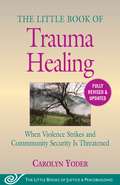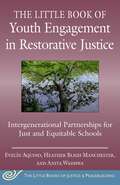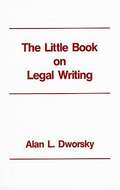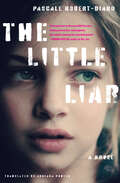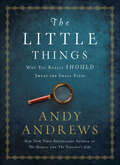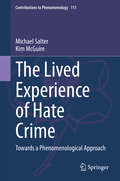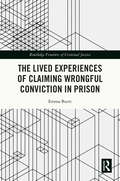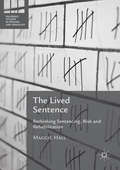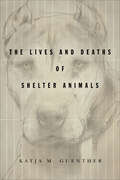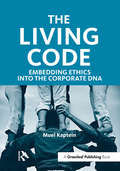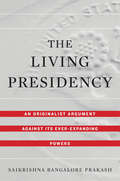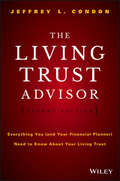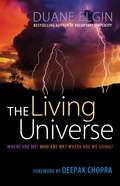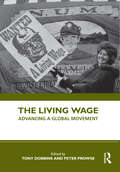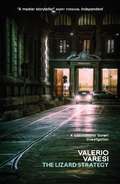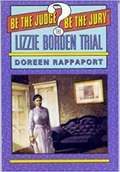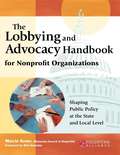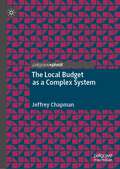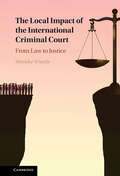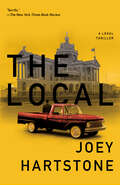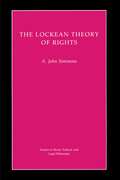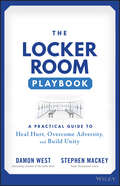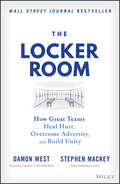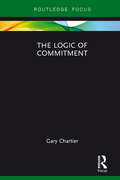- Table View
- List View
The Little Book of Trauma Healing: When Violence Strikes and Community Security Is Threatened (Justice and Peacebuilding)
by Carolyn YoderHow do we address trauma, interrupt cycles of violence, and build resilience in a turbulent world of endless wars, nationalism, othering, climate crisis, racism, pandemics, and terrorism? This fully updated edition offers a practical framework, processes, and useful insights.The traumas of our world go beyond individual or one-time events. They are collective, ongoing, and the legacy of historical injustices. How do we stay awake rather than numbing or responding violently? How do we cultivate individual and collective courage and resilience? This Little Book provides a justice-and-conflict-informed community approach to addressing trauma in nonviolent, neurobiologically sound ways that interrupt cycles of violence and meet basic human needs for justice and security. In these pages, you&’ll find the core framework and tools of the internationally acclaimed Strategies for Trauma Awareness and Resilience (STAR) program developed at Eastern Mennonite University&’s Center for Justice and Peacebuilding in response to 9/11. A startlingly helpful approach.
The Little Book of Youth Engagement in Restorative Justice: Intergenerational Partnerships for Just and Equitable Schools (Justice and Peacebuilding)
by Anita Wadhwa Evelín Aquino Heather Bligh ManchesterThe purpose of this book is to illuminate a theory of youth engagement in restorative justice that seeks to create systems change for more equitable schools. The authors define youth engagement in restorative justice as partnering with young people most impacted by structural injustice as changemakers in all aspects of restorative practices including community building, healing, and the transformation of institutions. Based on Adam Fletcher&’s version of the Ladder of Youth Engagement, coupled with Barbara Love&’s model of liberatory consciousness and an analysis of youth engagement in Restorative Justice in three different regions—Western Massachusetts, Oakland, and Houston—the authors provide a theoretical contribution: Youth Engagement in Restorative Justice grounded in liberatory consciousness. In this book readers will find:Comparative case studies from different parts of the country of youth led restorative justice programs.An exploration of the cultural and historical context of each region to situate the work. Stories from the authors' own lives that provide context for their interest in the work given their varied racial identities (White, Black, Latinx, South Asian) and upbringing. Literature review of the language of youth engagement vs. youth leadership/youth organizing/youth participation, along with a new definition of youth engagement in restorative justice.Theoretical framing based on Adam Fletcher&’s Ladder of Youth Engagement , which provides a structure for the book.Exploration of how adults must combat adultism both individually and systematically as a prerequisite to doing this work.Student narratives. Applications of the work in the virtual context.
The Little Book on Legal Writing
by Alan L. DworskyThis book is geared to the kind of writing first-year law students do in a standard legal writing course: memorandums and briefs. However, almost all the advice given applies to other kinds of legal writing as well, such as contracts and pleadings. In fact, much of the advice applies to nonfiction writing in general, because good legal writing is simply good writing. Each subject is broken down into simple, concise sections, making The Little Book on Legal Writing an excellent title for any professor s legal writing course.
The Little Book on Oral Argument
by Alan L. DworskyThis book is a concise, friendly guide to oral argument for law students and new lawyers, designed to introduce and cover its subject in a simple and entertaining, yet comprehensive, way. It contains chapters on such topics as style, substance, structure, questions, and rebuttal to explain effective approaches to this peculiar form of conversation. Second edition updates language and technical advances from the past two decades since the first edition was released.
The Little Liar: A Novel
by Pascale Robert-DiardThis sharp, compelling legal drama from an acclaimed French journalist explores why a teenage victim lied about her rape and how the disadvantaged become scapegoats.At 15, Lisa was a typical teenager, at times rebellious and impulsive, adjusting to newfound attention from boys and men. But when her demeanor takes a sudden turn, her teachers suspect something worse than adolescent moodiness. Lisa eventually confesses that she&’s been abused, multiple times, and suspicion quickly falls on Marco, a worker who had done projects at her parents&’ house. With his troubled history of drinking, unemployment, and casual sex, he&’s sentenced without hesitation to 10 years in prison.While others consider the matter settled and want to move on, guilt eats away at Lisa. No longer a minor, she drops her family&’s hotshot Parisian lawyer ahead of the appeal hearing and makes a surprise visit to the office of a local attorney, Alice. Unassuming yet dogged in seeking justice, Alice agrees to represent her, and bring to light the painful truths obscured by Lisa&’s past lies.Drawing on years of experience covering trials, Pascale Robert-Diard combines keen insight and a vivid, powerful writing style in this story at the intersection of the #MeToo movement and class inequality.
The Little Things: Why You Really Should Sweat the Small Stuff
by Andy AndrewsWall Street Journal BestsellerHave you ever wondered why we spend so much time and energy thinking about the big challenges in our lives when all the evidence proves it&’s actually the little things that change everything? That&’s right… Absolutely everything.Little Things embodies Andy&’s own approach to life and work, detailing for the first time some of the exclusive material that he uses to teach and coach some of the most successful corporations, teams, and individuals around the world. In his unique humorous style, Andy shows how people succeed by actually going against the modern adage, &“don&’t sweat the small stuff&”. By contrast, Andy proves that it is in concentrating on the smaller things that we add value and margin.Discover a new perspective and a game plan for meeting various challenges, such as:Managing life in a society that seems to be constantly offended by something or someoneCreating change that is permanent and not short termDramatically increasing results by harnessing the fraction of margin between second place and firstUnderstanding our spiritual connection with God and how that affects planning and outcomeIdentifying the very moment when asking the question why? multiplies the success of an endeavorRecognizing the smallest details that ensure the greatest success
The Lived Experience of Hate Crime: Towards a Phenomenological Approach (Contributions to Phenomenology #111)
by Michael Salter Kim McGuireThis book approaches the topic of the subjective, lived experience of hate crime from the perspective of Husserlian phenomenology. It provides an experientially well-grounded account of how and what is experienced as a hate crime, and what this reveals about ourselves as the continually reconstituted “subject” of such experiences. The book shows how qualitative social science methods can be better grounded in philosophically informed theory and methodological practices to add greater depth and explanatory power to experiential approaches to social sciences topics. The Authors also highlight several gaps and contradictions within Husserlian analyses of prejudice, which are exposed by attempts to concretely apply this approach to the field of hate crimes.Coverage includes the difficulties in providing an empathetic understanding of expressions of harmful forms of prejudice underlying hate crimes, including hate speech, arising from our own and others’ ‘life worlds’. The Authors describe a ‘Husserlian-based’ view of hate crime as well as a novel interpretation of the value of the comprehensive methodological stages pioneered by Husserl. The intended readership includes those concerned with discrimination and hate crime, as well as those involved in qualitative research into social topics in general. The broader content level makes this work suitable for undergraduate and postgraduate students, even professionals within law enforcement.
The Lived Experiences of Claiming Wrongful Conviction in Prison (Routledge Frontiers of Criminal Justice)
by Emma BurttThe Lived Experiences of Claiming Wrongful Conviction in Prison focuses on the lived experience of maintaining innocence in the prison environment and highlights the struggles and pain that such a claim can cause. Using the little utilised means of conducting an interview via a series of letters, the book details the experiences of 64 prisoners maintaining innocence in England and Wales, and examines in depth what is unique to this population. The chapters cover coping mechanisms, relationships maintained with relatives, relationships formed with prisoners and staff, and the perceived effect of their claims on matters of progression and parole. It draws on material from criminology, sociology, law, and psychology to provide a holistic account of this population’s experiences. The Lived Experiences of Claiming Wrongful Conviction in Prison will be of great interest to students and scholars across the disciplines of criminology, criminal justice, law, sociology, and psychology.
The Lived Sentence
by Maggie HallThis book examines the lives of the sentenced to argue that 'sentencing' should be re-conceived to consider the human perspective. It combines a range of modern criminological and legal theories together with interviews with prisoners in New South Wales, to examine their lives during and beyond completing the terms of imprisonment, for a more continuous and coherent perspective on the process of 'sentencing'. This book makes a strong argument for the practical advantages of listening to the voices of the sentenced and it is therefore a useful tool for the correctional community engaged in providing services and programmes to reduce recidivism. A methodological and well-researched text, this book will be of particular interest to scholars of criminal justice and the penal system, as well as policy makers and practitioners.
The Lives and Deaths of Shelter Animals: The Lives and Deaths of Shelter Animals
by Katja M. GuentherMonster is an adult pit bull, muscular and grey, who is impounded in a large animal shelter in Los Angeles. Like many other dogs at the shelter, Monster is associated with marginalized humans and assumed to embody certain behaviors because of his breed. And like approximately one million shelter animals each year, Monster will be killed. The Lives and Deaths of Shelter Animals takes us inside one of the country's highest-intake animal shelters. Katja M. Guenther witnesses the dramatic variance in the narratives assigned different animals, including Monster, which dictate their chances for survival. She argues that these inequalities are powerfully linked to human ideas about race, class, gender, ability, and species. Guenther deftly explores internal hierarchies, breed discrimination, and importantly, instances of resistance and agency.
The Living Code: Embedding Ethics into the Corporate DNA
by Muel KapteinOf the 200 largest organizations in the world, more than 80% currently have a corporate code of conduct. An ever larger number of smaller organizations also have a code or are in the process of developing one. While in the 1970s and 1980s companies had to explain why they had a code, today they are cross-examined if they don't have one. A company has to have very good arguments to convince stakeholders that they can do without a code.A business code is a measure for success: success as manager, employee, team and for the organization as a whole. Unfortunately, many codes are underutilized. And many simply fail, with serious repercussions for the organization.This short and accessible book presents a model to create, develop and embed business codes. The validated model enables managers and organizations to better manage their codes as well as their performance. The author articulates why a code of conduct is necessary, what it should cover, as well as demonstrating through practical tips and examples how to make full use of it. What is required to breathe life into a code and keep it that way? How can you live your code? Illustrated with results from an empirical study of the "Fortune" Global 200, the ideas developed are based on the worldwide experience of the consultancy firm KPMG. The author works in the field of developing, implementing and monitoring of codes, as well as conducting intensive academic research in the last 15 years in his capacity as (associate) professor of business ethics.The Living Code is a unique book and will be essential reading for those that want to make a success of their code or are considering developing one. Readers will learn just how rich and threatening a code is and what it could mean for their organization, their team and themselves.
The Living Presidency: An Originalist Argument against Its Ever-Expanding Powers
by Saikrishna Bangalore PrakashA constitutional originalist sounds the alarm over the presidency’s ever-expanding powers, ascribing them unexpectedly to the liberal embrace of a living Constitution. Liberal scholars and politicians routinely denounce the imperial presidency—a self-aggrandizing executive that has progressively sidelined Congress. Yet the same people invariably extol the virtues of a living Constitution, whose meaning adapts with the times. Saikrishna Bangalore Prakash argues that these stances are fundamentally incompatible. A constitution prone to informal amendment systematically favors the executive and ensures that there are no enduring constraints on executive power. In this careful study, Prakash contends that an originalist interpretation of the Constitution can rein in the “living presidency” legitimated by the living Constitution. No one who reads the Constitution would conclude that presidents may declare war, legislate by fiat, and make treaties without the Senate. Yet presidents do all these things. They get away with it, Prakash argues, because Congress, the courts, and the public routinely excuse these violations. With the passage of time, these transgressions are treated as informal constitutional amendments. The result is an executive increasingly liberated from the Constitution. The solution is originalism. Though often associated with conservative goals, originalism in Prakash’s argument should appeal to Republicans and Democrats alike, as almost all Americans decry the presidency’s stunning expansion. The Living Presidency proposes a baker’s dozen of reforms, all of which could be enacted if only Congress asserted its lawful authority.
The Living Trust Advisor: Everything You (and Your Financial Planner) Need to Know about Your Living Trust
by Jeffrey L. CondonA comprehensive guide to living trusts, with expert financial and legal guidance The Living Trust Advisor is an expert guide for both advisors and their clients on the complex process of establishing, living with, and maintaining a living trust. Written by renowned family inheritance attorney Jeffrey L. Condon, this book discusses the various aspects of this important document, and shows you how to manage a seamless transfer of assets to various beneficiaries. This new second edition has been fully updated and revised to reflect the extensive changes to the Estate Tax Law that have taken place since the initial publication, giving you the most up-to-date information and guidance on preserving your wealth and helping your heirs avoid estate tax liability. You'll develop a vision for your trust before you ever meet with an attorney or other key players, and learn how to establish and maintain a trust that remains rock-solid for your lifetime and beyond. As the living trust has replaced the will as the primary means of settling after-death estates, clear guidance and current legal information is of utmost importance for advisors and clients alike. This book is a valuable resource for every stage of planning and execution, helping you ensure that you provide for your beneficiaries the way you intend. Know what to think about before your first meeting with a lawyer Establish and manage your living trust to carry out your wishes Identify potential inheritance problems and build solutions into the trust Distribute assets to future generations, and protect them after the transfer Dealing with complex financial and legal issues while facing our own mortality is a difficult task, but making these decisions is critical to the future outcome of your estate. The Living Trust Advisor expertly guides you through the process so you can be confident that your wishes will be carried out.
The Living Universe: Where Are We? Who Are We? Where Are We Going?
by Duane ElginBy the bestselling author of Voluntary Simplicity (over 150,000 sold)• Brings together cutting-edge science and ancient spiritual wisdom to demonstrate that the universe is a living, sentient system and that we are an integral part of it• Explores the power of this new paradigm to move humanity toward a sustainable and promising futureScience has traditionally regarded the universe as mostly made up mostly of inert matter and empty space. At one time this point of view was liberating, part of the Enlightenment-born rationalism that helped humanity free itself from superstition and fear and achieve extraordinary intellectual and technological breakthroughs. But this paradigm has outlived its usefulness. It has led to rampant materialism and environmental degradation—if the universe is essentially dead and we are alive, then the inanimate stuff of the universe should be ours to exploit. But we now know that not only is the view of a dead universe destructive, it is also inaccurate and misleading.In The Living Universe, Duane Elgin brings together evidence from cosmology, biology, physics, and even his participation in NASA-sponsored psychic experiments to show that the universe is permeated by a living field and that we are always in communion with that field of aliveness whether we are conscious of it or not. This is a world-view that, as Elgin explains, is shared by virtually every spiritual tradition, and the implications of it are vast and deep. In a living system, each part is integral to the whole, so each of us is intimately connected to the entire universe. Elgin eloquently demonstrates how our identity manifests itself on a whole series of levels, from subatomic to galactic. We are, he writes, “far more than biological beings—we are beings of cosmic connection and participation.”To confront our ongoing planetary crisis of dwindling resources and escalating conflict, we need to move past an ideology of separation, competition, and exploitation. Duane Elgin asks us to see humanity sharing in the same field of aliveness, to discover how to live sustainably and harmoniously within the living universe.
The Living Wage: Advancing a Global Movement
by Tony DobbinsAs wealth inequality skyrockets and trade union power declines, the living wage movement has become ever more urgent for public policymakers, academics, and – most importantly – those workers whose wages hover close to the breadline. A real living wage in any part of the world is rarely its minimum wage: it is the minimum income needed to cover living costs and participate fully in society. Most governments’ minimum wages are still falling short, meaning millions of workers struggle to cover their living costs. This book brings new, vital insights to the conversation from a carefully selected group of contributors at the forefront of this field. By juxtaposing advances across sectors and countries, and encompassing many different approaches and indeed definitions of the living wage, Dobbins and Prowse offer a rich tapestry of approaches that may inform public policy. By including the experiences and voices of those workers earning at, or near, the living wage alongside the opinions of leading experts in this field, this book is a pioneering contribution for public policymakers as well as students and academics of work and employment relations, public policy, organizational studies, social economics, and politics.
The Lizard Strategy
by Valerio VaresiItaly's Maigret returns in another smouldering noir from a master of the police procedural "A master storyteller" Barry Forshaw, IndependentParma is blanketed in snow, but this pristine, white veneer cannot mask the stench of corruption. Its officials are no longer working for its people - only for themselves - crime is out of control and resentment festers in every district. Commissario Soneri remains at heart an idealist, so the state of Parma wounds him more than most. And now he is presented with three mysteries at once, each more impenetrable than the last. In a river creek on the outskirts of the city, tipped off by a local, he finds a mobile phone that rings through the night but holds no data; an elderly patient with senile dementia is reported missing from a hospice; and the mayor of Parma, who was reported as taking a holiday on the ski slopes, has disappeared off the face of the earth - just when he seemed certain to be implicated in a seismic corruption scandal at city hall.
The Lizzie Borden Trial (Be the Judge? Be the Jury)
by Doreen RappaportReaders step into the jury box and judge the testimony of family, friends, the Borden housekeeper, and medical experts to decide for themselves if Lizzie Borden murdered her father and stepmother.
The Lobbying and Advocacy Handbook for Nonprofit Organizations: Shaping Public Policy at the State and Local Level
by Marcia AvnerThe author provides broad scope of information and road map for nonprofit lobbying at the state and local level.
The Local Budget as a Complex System (Palgrave Studies in Public Debt, Spending, and Revenue)
by Jeffrey ChapmanThis book examines budgeting by analyzing the local government budget as a complex system, thus adding a new dimension to traditional budget textbooks. It is designed to complement existing texts—not replace—by putting the budget in a complex system, general equilibrium framework. A complex systems framework adds to conventional budget analysis in at least four ways: It looks at the budget as the result of many variables that are outside the finance department’s purview; it understands that there are multiple interdependences among these variables; it suggests analysis of non-obvious relationships among actions in the budget process in order to optimize results; and it argues that the actors in the process must understand that their budgetary behaviors have indirect and far-reaching implications that go beyond the budget document. This book also uses concepts seldom discussed in the budgetary literature—that of governance, including concepts of the facilitative state, with adjustments for exogenous shocks; the forms of decision making; and the political climate of the jurisdiction. This framework notes methods of success of firms in the private sector that operate in environments of rapid technological change. While becoming a popular theoretical framework for how private sector firms change, dynamic capability analysis has received little attention in the public management field. This book utilizes DC since public sector organizations also face rapidly changing environments. Lastly, the book discusses the potential relationship between the local budget and local community welfare maximization.
The Local Impact of the International Criminal Court The Local Impact of the International Criminal Court: From Law to Justice
by Marieke WierdaThe International Criminal Court seeks to end impunity for the world's worst crimes, to contribute to their prevention. But what is its impact to date? This book takes an in-depth look at four countries under scrutiny of the ICC: Afghanistan, Colombia, Libya, and Uganda. It puts forward an analytical framework to assess the impact of the ICC on four levels: on the domestic legal systems (systemic effect); on peace negotiations and agreements (transformative effect); on victims (reparative effect); and on the perceptions of affected populations (demonstration effect). It concludes that the ICC is having a normative impact on domestic legal systems and peace agreements, but it has brought little reparative justice for victims, and it does not necessarily correspond with how affected populations view justice priorities. The book concludes that justice for the world's worst crimes has no 'universal formula' that can easily be captured in law by one institution.
The Local: A Legal Thriller
by Joey HartstoneA freewheeling, small-town attorney takes on a national murder trial when an out-of-town client is accused of killing a federal judge in Texas.&“A spectacular courtroom thriller that kept me turning pages like the best of Grisham or Turow." —Michelle King, co-creator of The Good Wife, The Good Fight, and EvilThe town of Marshall, Texas, is the epicenter of intellectual property law in the US—renowned for its speedy trials and massive payouts. One of its best lawyers is James Euchre. His newest client, Amir Zawar, is a CEO forced to defend his life&’s work against a patent infringement claim. But when a beloved hometown hero is murdered, all signs point to Zawar, an outsider with no alibi. With the help of a former federal prosecutor and a local PI, Euchre hopes to uncover the truth. In his first criminal case, the stakes couldn&’t be higher. Euchre fears either an innocent man will be sent to death row, or he&’ll help set a murderer free. The Local is a small-town thriller crackling with courtroom tension right up to the final verdict.
The Lockean Theory of Rights (Studies in Moral, Political, and Legal Philosophy #2)
by A. John SimmonsJohn Locke's political theory has been the subject of many detailed treatments by philosophers and political scientists. But The Lockean Theory of Rights is the first systematic, full-length study of Locke's theory of rights and of its potential for making genuine contributions to contemporary debates about rights and their place in political philosophy. Given that the rights of persons are the central moral concept at work in Locke's and Lockean political philosophy, such a study is long overdue.
The Locker Room Playbook: A Practical Guide to Heal Hurt, Overcome Adversity, and Build Unity
by Damon West Stephen MackeyDiscover how to achieve success together with this hands-on guide to the lessons found in The Locker Room In The Locker Room Playbook: A Practical Guide to Heal Hurt, Overcome Adversity, and Build Unity, bestselling author Damon West and player development coach Stephen Mackey teach you how to apply the principles and concepts found in The Locker Room. You&’ll find lists of core lessons, chapter summaries, detailed lesson breakdowns, discussion questions, exercises, and key takeaways in every chapter. You&’ll also discover: Insightful commentary on key concepts, including respect, loyalty, character, teamwork, prejudice, integrity, and mental health Crucial blueprints for helping athletes, professionals, and students learn how to navigate all aspects of their lives How to rely on your teammates, coaches, colleagues, leaders, and partners to achieve success togetherFilled with must-have team building and coaching resources, this book proves that there&’s always a path teams can take that allows them to work together. The Locker Room Playbook is your roadmap to finding that path and staying on it as you and your team work together to overcome adversity.
The Locker Room: How Great Teams Heal Hurt, Overcome Adversity, and Build Unity
by Damon West Stephen MackeyExplore the power of communication to heal hurt, overcome adversity, and build a unified team In The Locker Room, bestselling author Damon West and player development coach Stephen Mackey team up to explore difficult conversations about eliminating both discrimination and the cancel culture, as well as overcoming adversity. The book tells the story of four characters: two high school football coaches and two players, each of whom must deal with the fallout of an offensive comment that severely disrupts the unity and cohesion of their locker room and threatens to destroy their team. In The Locker Room, you’ll find: A guide to building an inclusive culture The blueprint for using servant leadership and a willingness to listen to break down barriers Encouragement to have the difficult conversations that lie at the heart of modern life Strategies for navigating your personal and professional life in a way that gracefully deals with the realities of prejudice, discrimination, and cancel culture Techniques for giving all people an equal voice and an equal chance at success through learning with humility and teaching with grace An indispensable exploration of some of the most critical and most difficult issues faced by professionals, coaches, athletes, and students today, The Locker Room is a must-read resource that belongs in the libraries of anyone who seeks a life or culture that can not only overcome adversity, but can also use it to reach their goals and improve their communities.
The Logic of Commitment (Routledge Focus on Philosophy)
by Gary ChartierThis book develops and defends a conception of commitment and explores its limits. Gary Chartier shows how commitment serves to resolve conflicts between ordinary moral intuitions and the reality that the basic aspects of human well-being are incommensurable. He outlines a variety of overlapping and mutually reinforcing rationales for making commitments, explores the relationship between commitment and vocation and the relevance of commitment to love, and notes some reasons why it might make sense to disregard one’s commitments. The Logic of Commitment will appeal to ethicists interested in the connection between commitment and personal well-being, and to anyone who wonders why and when it might make sense to make or keep commitments.
